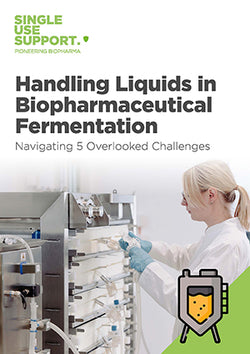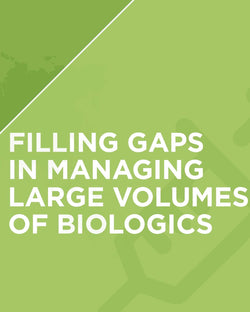Precision Fermentation simply explained
Precision fermentation uses microbial hosts to produce a particular end product. Other terms used for precision fermentation are bacterial and microbial fermentation. Precision fermentation is used in a variety of ways in both the food industry and pharmaceutical industry to produce biopharmaceuticals.
In this article, we will discuss what precision fermentation is and dive into its various aspects, including the precision fermentation process, the rapidly growing fermentation market, precision fermentation as a food technology, or as a technology for advanced therapies, and the challenges in precision fermentation manufacturing.
Precision fermentation process explained
The main distinction between precision fermentation and fermentation is that the microorganisms used in precision fermentation are designed to create a particular end product. Precision fermentation is a more advanced kind of metabolic fermentation, where living organisms convert organic chemicals from the feedstock into usable components.
With the help of certain enzymes, a lot of biomass is produced, the microbes are multiplied and bred in small factories. The target product is recovered and refined to produce a functional product once a critical mass has been reached. Collaboration between teams from fermentation, downstream processing, purification, and strain engineering is essential to the process.
One application of precision fermentation is the production of chymosin, a type of rennet that is used to make cheese. Besides the food industry, precision fermentation is also used in biopharma. The production of small, complex molecules such as bioconjugates like ADCs (antibody drug conjugates) is driving the growth of the precision fermentation market.

[[download-1]]
Precision fermentation market is rapidly growing
The market for precision fermentation is expanding, and its development trajectory is impressive. The market, which was estimated to be worth USD 293.75 million in 2021, is projected to expand at a phenomenal CAGR of 38.73%. (techsciresearch.com August 2022)
This rapid expansion can be linked to a number of factors, including rising consumer demand for renewable energy and initiatives for environmentally friendly food and drink items, veganism movements with less dairy products and dairy proteins, and the demand for cutting-edge pharmaceutical treatments.
Precision fermentation technology provides inputs for more effective and consistent production of goods. This is since the process is managed and optimized for maximum output, guaranteeing that the outcome fulfills the required criteria. Precision fermentation has become a popular choice for fermentation companies and startups in the food system, beverage, and pharmaceutical industries because of its consistency and dependability, which has aided in the market's expansion.
Precision fermentation technology
Precision fermentation involves the use of genetically modified microorganisms to produce high-value compounds such as proteins, enzymes, and other bioactive molecules. Precision fermentation is a sustainable and cost-effective approach to create a wide range of products with diverse applications, from plant-based meat alternatives to drugs and vaccines. Precision fermentation technology is being applied in the food and biopharmaceutical markets. Learn more about it in the following paragraphs.
Precision fermentation technology for food production
Please note, we at Single Use Support are experts in end-to-end processes for fully automated filling and freezing in biopharma. We freeze liquids down to -180 degrees. This is not necessary in the food industry and therefore not our market. However, we would like to give you a holistic overview of precision fermentation:
With precision fermentation technologies, food can now be produced without the use of living things, soil, or conventional farming practices thanks to innovative technologies. This not only increases the sustainability of the production process, but it also has the potential to entirely change how we produce animal-free food in the future by using less animal products, such as whey.
The main benefit is that it offers a precise and regulated environment for the growth of microorganisms that are utilized to manufacture food ingredients like casein, vinegar, yeast, and other fermented dairy and protein products, or ice cream. The production of sources of alternative protein, plant-based animal protein alternatives for plant-based foods, plant-based protein, supplements and alternative egg white and meat products is also accomplished using this method.
By using this technology, it is possible to achieve high yields of food products while using fewer resources and reducing the carbon dioxide footprint of food production to fight climate change and reduce greenhouse gas emissions.
It allows producing food in areas where traditional agriculture may not be possible due to environmental factors and ecosystem like drought or soil degradation. This opens the possibility of providing food for people living in food-insecure regions, reducing the need for imported food and contributing to food security and sustainability of the supply chain.

Precision fermentation for advanced therapies
Precision fermentation or in other words bacterial & microbial fermentation is becoming an increasingly popular technology to produce biopharmaceuticals, such as recombinant proteins and bioconjugates. In the past, mammalian cell culture was favored over microbial fermentation, but the trend is now shifting back towards the latter due to the development of smaller, complex next-generation drugs.
Key factors in the renewed interest in microbial fermentation include the development of next-generation therapies and advances in genetically engineered microbial strains. Microbial fermentation provides faster development, higher yields, better scalability, and lower production costs compared to mammalian cell culture.
Read more about the differences between microbial fermentation and mammalian cell culture | fermentation in the pharmaceutical industry | Microbial cGMP production: complete guide & manufacturer's overview
Challenges in precision fermentation manufacturing
One of the most difficult challenges is the scale-up process, which requires converting the small-scale laboratory process into a large-scale manufacturing process. This process must achieve the same productivity and quality as the small-scale process while maintaining control over physical, biochemical, and process factors.
Biochemical engineering plays a crucial role in this transformation, and the scale-up process usually involves process validation and the use of new or modified equipment.
The key to success is to achieve project goals, produce products of interest with acceptable quality and yield, and fully understand and control the risks associated with large-scale manufacturing. New single-use technologies offer new possibilities for large-scale fermentation, with the ability to fill large volumes of over 1000L into small single-use bags within 8 hours, freeze them, and prepare them for transport.
Read our article about cold chain handling for fermentation to learn more about the cold chain requirements and single-use solutions in this area.
FAQ
What is precision fermentation?
+
What is precision fermentation?
Precision fermentationuses genetically modified microorganisms to produce specific proteins, enzymes, and other compounds. This is accomplished by inserting genes into the microorganisms' DNA to allow them to produce the desired product. The term "precision" refers to the ability to precisely control the process, from the genetic modification of the microorganisms to the optimization of fermentation conditions.
What is the difference between general fermentation and precision fermentation?
+
What is the difference between general fermentation and precision fermentation?
The main distinction between precision fermentation and general fermentation is that the microorganisms used in precision fermentation are designed to create a particular end product.
Is precision fermentation sustainable?
+
Is precision fermentation sustainable?
Precision fermentation is a sustainable food technology, as it can be used to produce high-value compounds without relying on traditional agriculture or animal husbandry. This reduces the environmental impact of food and biopharmaceutical production, as it requires less land, water, and other resources. Additionally, precision fermentation can also be used to produce products that are more environmentally friendly than their traditional counterparts, such as plant-based meat alternatives.
What are advantages of precision fermentation?
+
What are advantages of precision fermentation?
One advantage of precision fermentation is the ability to produce high-value compounds with precision and consistency, which can lead to cost savings and improved product quality. Additionally, precision fermentation has the potential to reduce the environmental impact of food and biopharmaceutical production, as it requires fewer resources and can be used to produce more sustainable alternatives to traditional products. Precision fermentation can also be used to produce novel therapies with high specificity and potency, including biologics, vaccines, and gene therapies.
What are disadvantages of precision fermentation?
+
What are disadvantages of precision fermentation?
There are concerns about the safety and regulatory aspects of precision fermentation products. Especially in the biopharmaceutical market, rigorous testing and approval processes are required. Moreover, there may be ethical and societal concerns regarding the use of genetically modified microorganisms for food and drug production.

Download guide
Guide: Challenges in biopharmaceutical fermentation
Guide about microbial or mammalian fermentation with regards to fluid and cold chain management challenges. In detail:
- Advanced Bulk Plate Freezing replacing Spray Drying
- Protection of Bags Reduce Product Loss
- Scalability in Yeast, Bacterial or Fungal Fermentation
- Speed of Large Volume Filling and Freezing
- Integrated End-to-End Logistics in Continuous Production
Learn more to navigate 5 of these most overlooked challenges in this Fermentation Guide.

Download eBook
eBook: Filling gaps in managing large scale volume of biologics
This eBook gives you more insights about:
- What gaps need to be filled in bioprocessing?
- Hurdles to overcome in handling pharmaceuticals
- New approaches to tackle these challenges
- Future Prospects: A glimpse into the crystal ball
